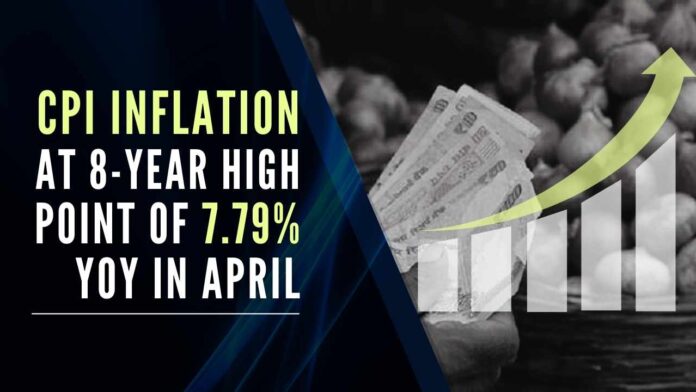
CPI inflation at 8-year high may trigger quicker rate hikes
Sounding a red alert on India’s CPI inflation at an 8-year high point of 7.79% YoY in April, Acuite Ratings has said it may trigger quicker rate hikes.
Globally most economies have shifted from an extended disinflationary phase to tackling strong inflationary concerns, causing key central bank’s monetary policy rhetoric to switch to extreme hawkishness and policy tightening in 2022 from pandemic-era accommodative policies.
“If inflation pressures continue to mount there is a likelihood of additional hikes thereby taking the rate to its pre-pandemic level of 5.15 percent or even higher in FY23. Additionally, we also expect CRR to be hiked by another 50 bps by H1FY23,” Acuite Ratings said.
Given the tone of urgency in RBI’s statement to support the altered inflation-growth dynamics, “we now revise our call and expect the RBI to hike repo rate by an additional 60 bps in the rest of FY23″.
The increasing price pressures were in motion even before the onslaught of the geopolitical conflicts. However, the lingering war between Russia and Ukraine, unprecedented level of sanctions, elevated oil, and commodity prices along with prolonged supply chain disruptions have escalated the inflationary concerns both in the global as well as domestic economies, it said.
“From a domestic standpoint, for FY23, inflation drivers are likely to face considerable pressure from persistent hardening of input prices. The heightened pressure from commodity prices is also coinciding with the unlocking of the economy post-Omicron wave while vaccination coverage continues to gain traction. While we stick to our estimate of 5.9 percent for FY23 CPI inflation, we now believe that there is a buildup of upside risks,” Acuite Ratings said.
“Going forward, we expect the core inflation to remain sticky at elevated levels given upward revision of petrol and diesel prices by the OMCs in order to reduce the under-recoveries being accumulated by them at the current crude prices of USD 100 plus per barrel.”
Acuite Ratings said the government, however, may also consider a partial absorption of the increased prices through a further excise duty cut on petrol and diesel which could provide marginal comfort from an inflation perspective. While the direct pass-through of elevated commodity prices can be seen through increased prices of petrol and diesel and non-subsidized LPG, the indirect pass-through of unprecedented input cost pressures by manufacturers is visible through rising prices of certain personal care products within the FMCG sector which will get reflected in the core CPI print in the coming months.
After moderating close to RBI’s inflation target rate in September-21, headline CPI inflation has been rising incessantly with the print breaching the upper tolerance threshold in Q4 FY22, averaging at 6.34 percent. It started to gather steam in April-22 gaining strength from the geopolitical crisis and rising to an eight-year high of 7.79 percent YoY from 6.95 percent YoY in March-22.
[With Inputs from IANS]
PGurus is now on Telegram. Click here to join our channel and stay updated with all the latest news and views
For all the latest updates, download PGurus App.










